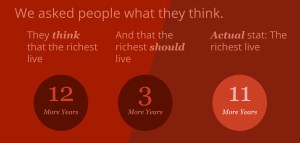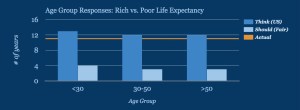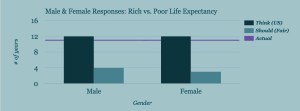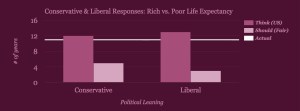Life (and the Pursuit of Happiness)– But for How Long?
Confronting our mortality is not an easy task for most people. However, there are many reasons people should consider just how long they might live.
In the case of retirement planning, life expectancy is important in relation to the benefits like Medicare and Social Security that people earn during their working years. According to the Pew Research Center, use of these government benefits programs is “virtually universal (97%) among those ages 65 and older—the age at which most adults qualify for Social Security and Medicare benefits.”
Differences in life expectancy between the rich and the poor can mean that more affluent Americans receive hundreds of thousands of dollars more in benefits that those who are less well off. In addition to the economic considerations, there is a psychological and perhaps even moral factor that comes into play when thinking about how long we might expect to live in relation to our financial status.
Topic 3 in Fair Game? asked users to think about exactly this question and to estimate how income is related to life expectancy and what that relationship should be in a fair world.
“It will surprise nobody to learn that life expectancy increases with income.”— Michael Specter, 4/16/16, The New Yorker
On the whole, our users estimated that the richest 10% of society would have a life expectancy 12 years longer than the poorest 10%. In reality, the difference is 11 years (12 additional years for men and 10.1 additional years for women).
How many more years of life do they think the wealthy should expect in a fair world? 3 more years (a 75% reduction from their estimate of what is true).
Estimates for the current difference in life expectancy were remarkably similar across all age groups, as were our users’ beliefs about what would be fair. Preferences for a fair difference were also similar. There may be hints of a difference between younger and older adults, with a possible explanation simply being ‘mortality salience’, or how much longer users themselves’ expect to live.
What about gender? Both males and females estimate 12 more years of life for the top 10%. But they differ slightly in what they think a fair amount of additional years would be — 4 vs. 3, respectively.
And political leaning? People who identify as conservative and those who identify as liberal only differed by 1 year in terms of what they believed the life expectancy gain from wealth to be, and 2 years in what they thought it should be in a fair world. Conservatives estimate the gain to be 12 years, while liberals put it at 13 years. In terms of what they think would happen in a fair society, conservatives consider 5 years and liberals consider 3 years to be a fair number of years gained with wealth. Despite these small differences, the presumed improvement (from what is thought to what it should be) ends up being 7 years for conservatives vs. 10 years for liberals.
Together, the data reported here suggest that estimations of the present gap in life expectancy are fairly accurate. And that small differences in life expectancy (3-5 years) are considered fair (or perhaps tolerable) by most people. Has the wealth-based life expectancy gap always been this large? According to a Brookings report, it has actually grown from 4.5 years (for the cohort of seniors born in 1920) to 11 years (for the cohort born in 1940). It is likely that multiple factors, including differential access to quality medical care, and higher rates of smoking and obesity, contribute to the growth of this gap. On top of all of this, wealthier people typically retire later and can delay receiving social security payments, thereby increasing income inequality in the older population.
Unfortunately, public benefits that were originally intended to be progressive seem to be becoming (unintentionally) regressive over time. Perhaps there are some solutions that might help to keep more Americans living long, happy, and healthy lives?
What do you think? Please join us and play along by downloading Fair Game? from iTunes or Google Play.
The Little Bank That Did.
Over the last few years, I’ve had some harsh words for bankers, banks, and the culture of the industry. In truth, I could have said worse, and it would have been justified.
That’s why the story of this bank—the Hancock Bank of Mississippi—deserves to be told, watched, and learned from. This is a case where banks play the role they are ideally meant to play, that is, they invest in the stabilization and growth of the community they’re part of, and wind up profiting in the long run from those investments.
It’s the way they did this that’s particularly remarkable—by literally laundering debris-covered dollar bills and handing them out to people in the days immediately following the Hurricane Katrina. How and why they did this is best left to the film clip; suffice it to say that Hancock gave out around $50 million in cash, with handwritten IOUs for contracts, and lost (only) about $200,000 of that when all was said and done. But in the 3 months following the storm, Hancock grew by $1.4 billion. It’s not hard to imagine that the kind of genuine investment they made in their community—both customers and not—earned so much loyalty.
Banks and their leadership have a long way to go to get out of the hole they’ve dug for themselves in the minds of most people. While disasters provide a great opportunity to show caring, I don’t think that banks need to wait for another hurricane to do something –there are many ways to show care and commitment to the community, and it’s in everyone’s interest that they start soon.
Bogus Bonuses and C.E.O. Salaries
One of the most common justifications for hefty C.E.O. compensation packages is that if the leaders of industry are not paid well, the so-called best and brightest will no longer flock to fill the corporate ranks, and will instead go elsewhere. High salaries (and bonuses, etc) are said to both motivate and retain these brilliant minds.
While this sounds somewhat plausible, as it turns out, a new study shows that it’s just not true. One driver of executive pay, called the peer-group benchmark, compares the salaries of executives among ostensibly similar companies as a way of keeping salaries competitive and within reasonable market limits. The problem is, this measure assumes that a C.E.O. at one company could pick up and leave for greener pastures at another, which, as it turns out, is a false presumption.
The study, conducted by Charles M. Elson and Craig K. Ferrere, shows that many of the skills C.E.O.s possess are specific to the company in which they are acquired, and are not readily transferable to other companies. Their analysis shows that almost every attempted transplant at the top ranks has resulted in failure.
What this means is that all this benchmarking makes the market of C.E.O.s seem like a market with high mobility, allowing for C.E.O.s to move to other companies when in fact a C.E.O. who manages one company well is unlikely to be successful in another. Therefore, a company looking for a C.E.O. cannot actually consider all C.E.O.s as potential candidates. Benchmarking, then, is little more than a way to inflate executive salaries by comparing jobs in markets that are essentially incomparable.
Ultimately this study shows that determining executive salaries needs to be reevaluated and reconfigured with an eye to empirical data, even if that means reducing C.E.O. pay. After all, we are all shareholders in these companies and they are giving away our money for what turns out to be no good reason.
Ask Ariely: On Parking, Paying, and Putting
Here’s my column from the WSJ this week — and if you have any questions for me, just email them to askariely@wsj.com
______________________________________________________
Dear Dan,
What should I do about parking? I have trouble deciding whether I should go for a paid parking lot straight away or drive around in the hope of finding free parking—but at the risk of wasting time.
—Cheri
This is a question about the value of your time. You need to figure out how much money an hour of fun out of the house is worth to you and compare that cost with the time it takes to find a parking spot. For example, if an hour out of the house is worth $25 to you, and searching for parking takes 30 minutes on average, then any amount less than $12.50 that the parking lot charges you is worth it. As the number of people in your car rises, the value of parking quickly also rises because the waste of time and reduction of value accumulate across all the people in your group.
Another computational approach is to compare the misery you feel from paying for parking with the misery you feel while seeking a spot. If the misery from payment isn’t as great as the unhappiness from your wasted time, you should go for the parking lot. But if you do this, you shouldn’t ignore the potential misery you would feel if you paid for parking and then found a free spot just outside your destination. Personally, the thought of time wasted is so unbearable to me that I usually opt for paid parking.
Yet another approach is to put all the money that you intend to spend on going out in an envelope in advance. As you’re on the way to the restaurant or movie theater, decide whether that money would be better spent on parking or other goods. Is it worth it to forgo that extra-large popcorn if paying for parking will get you to the theater on time? That makes the comparison clearer between what you get (quick parking and more time out) and what you give up.
______________________________________________________
Dear Dan,
When going to dinner with friends, what is the best way to split the bill?
—William
There are basically three ways to split the bill. The first is for everyone to pay for what they’ve had, which in my experience ends the meal on a particularly low point. Every person has to become an accountant. Given the importance of endings in how we frame our memories of experiences, this is a particularly bad approach. Rather than remembering how delicious the crème brûlée was, you may be more likely to remember that Suzie ate most of it even though you paid for half.
The second approach is to share the bill equally, which works well when people eat (more or less) the same amount.
The third approach, my favorite, is to have one person pay for everyone and to alternate the designated payer with each meal. If you go out to eat with a group relatively regularly, it winds up being a much better solution. Why? (A) Getting a free meal is a special feeling. (B) The person paying for everyone does not suffer as much as his or her friends would if they paid individually. And (C) the person buying may even benefit from the joy of giving.
Let’s take the example of two friends, Jaden and Luca, who are going out to their favorite Middle Eastern restaurant. If they were to divide the cost of the meal evenly, each would feel, say, 10 units of misery. But if Jaden pays, Luca would have zero units of misery and the joy of a free meal. Because of diminishing sensitivity as the amount of money paid increases, Jaden would suffer fewer than 20 units of misery—maybe 15 units. On top of that, he might even get a boost in happiness from getting to buy his dear friend a meal.
______________________________________________________
Dear Dan,
I play in a weekly nine-hole golf league. There’s one individual who constantly talks on his cellphone, moves around while others are putting and mostly ignores the courtesies of golf. He’s been asked to stop this behavior but continues with a bully attitude. How do I handle it?
—Wally K.
Though you might be tempted to rip the phone from his hands, throw it on the ground and bash it with your 9-iron, I would suggest another solution.
You could implement a new rule, whereby everyone else playing with you earns a mulligan (a “do over” shot) each time the bully talks on the phone. Getting constant negative feedback (in addition to giving everyone a performance boost) would probably whip him into shape. Just be sure to take the mulligans consistently, every time he’s on the phone, so that his behavior is reliably punished and the message sticks.
Rethinking Money for the New Year
In today’s economy, consumers and financial institutions alike are constantly on the lookout for new ways to reduce spending. As you read this article, consider these questions: what cost-cutting habits has your organization developed, and are they rational? Do you recognize irrational or habitual spending tendencies in your own customers and members? If so, how can you help them make better decisions that lead to improved savings?
Money is an integral part of modern life. We constantly make decisions about whether we’re willing to pay for different products and, if so, how much we are willing to pay. In fact, we make decisions about money so often that we consider money to be a natural part of our environment.
However, money is a relatively recent invention, and despite its incredible economic usefulness it does come with its own set of problems. In particular, it turns out that decisions about money are often unintuitive and, in fact, quite difficult. Consider the following situation as an example: you are thirsty, tired, and annoyed and just want a cup of coffee. You see two coffee shops across the street from each other. One is a specialty coffee shop that sells handcrafted, designer coffee and the other is Dunkin’ Donuts, which sells standard, decent coffee. The price difference between the two options is $1.75 for your cup-a-joe. Now, how do you decide if the benefit of the handcrafted coffee drink is worth the additional $1.75?
What you should do (if you wanted to be rational about it) is consider all of the things that you could buy with that $1.75, now as well as in the future, and decide to buy the expensive coffee only if the difference between the two coffees is more valuable than all of those other possibilities.
But of course this computation would take hours, it is incredibly complex, and who even knows all the possible options to consider?
Heuristically Speaking
So what do we do when we need to make decisions but making them “correctly” is too time-consuming and difficult? We adopt simplifying rules, which academics call heuristics, and these heuristics provide us with actionable outcomes that might not be ideal but that help us to reach a decision. One of the heuristics we often use is to look at our own past behaviors, and if we find evidence of relevant past decisions, we simply repeat those.
In the case of coffee, for example, you might search your memory for other instances in which you visited regular or fancy coffee shops. Then you might assess which behavior is more frequent, and tell yourself, “If I’ve done Action X more than Action Y in the past, this must mean that I prefer Action X to Action Y” and as a consequence, you make your decision.
The strategy of looking at our past behaviors and repeating them might seem at first glance to be very reasonable. However, it suffers from at least two potential problems. First, it can turn a few mediocre decisions into a long-term habit. For example, after we have gone to a fancy coffee shop three times in a row and paid a premium for the same coffee we could get elsewhere, we might continue with this strategy for a long time without reconsidering how much we are really willing to pay for coffee.
The second downfall is that when market conditions change, we are unlikely to revise our strategy. For example, if the price difference between the regular and fancy coffee used to be $0.25 and over the years has increased to $1.75, we might stay with our original decision even though the conditions that supported it are no longer applicable.
Examine old habits
In light of our current financial situation, many people these days are looking for places to cut financial spending. Once we understand how we use habits as a way to simplify our financial decision making, we can also look more effectively into ways to save money.
If we assume that our past decisions have always been sensible and reasonable then we should not scrutinize our long-term habits. After all, if we’ve done something for five years, it must be a great decision. But if we understand that long-term, repeated behaviors might reflect our habitual decision making in the face of complex financial decisions more than they reflect what is truly best for us, we might first examine our old habits and carefully consider whether they indeed make sense or not. We can examine our subscription to the ESPN Sports Package, our annual subscription to the opera, our yearly Disneyland vacation, or our monthly visit to the hairstylist.
By examining these habits — and quitting them when it makes sense to do so — we might actually discover ways in which we could reduce our spending on a long-term basis.
Yes, money is complex, and it is incredibly difficult for us to carefully examine (and re-examine) every purchasing decision we make. But the advantage of examining our habits is that it might lead us to create better ones that will benefit us for a long time.
May you have a happy and exciting new year,
Dan
This column first appeared at http://www.deluxeknowledgeexchange.com
The Psychology of Gift-Giving
Here it is again: holiday gift-giving season – the best win-win of the year for some, and a time to regret having so many relatives for others.
Whatever your gift philosophy, you may be thinking that you would be happier if you could just spend the money on yourself – but according to a three-part study by Elizabeth Dunn, Lara Aknin, and Michael Norton, givers can get more happiness than people who spend the money on themselves.
Liz, Lara and Mike approached the study from the perspective that happiness is less dependent on stable circumstances (income) and more on the day-to-day activities in which a person chooses to engage (gift-giving vs. personal purchases).
To that end, they surveyed a representative sample of 632 Americans on their spending choices and happiness levels and found that while the amount of personal spending (bills included) was unrelated to reported happiness, prosocial spending was associated with significantly higher happiness.
Next, they took a longitudinal approach to the topic: they gave out work bonuses to employees at a company and later checked who was happier – those who spent the money on themselves, or those who put it toward gifts or charity. Again they found that prosocial spending was the only significant predictor of happiness.
But because correlation doesn’t imply causation, they next took one more, experimental, look at the topic. Here, they randomly assigned participants to “you must spend the money on other people” and “spend the money on yourself” conditions — and gave them either $5 or $20 to spend by the day’s end. They then had participants rate their happiness levels both before and just after the experiment.
The results here were once more in favor of prosocial spending: though the amount of money ($5 vs $20) played no significant role on happiness, the type of spending did.
Surprised by the outcome? You’re not the only one: the researchers later asked other participants to predict the results and learned that 63% of them mistakenly thought that personal spending would bring more job than prosocial purchases.
Happy holidays
Dan
Visual illusions and decision illusions
Consider some of illusion at the bottom of the demo page (click here to see it).
The two middle color patches look as if they are different, but in fact they are exactly the same. What is gong on here? How can it be that we see wrong? How can it be that eve after we are shown that these two patches are identical we still can’t see them accurately?
It is because our brain is wired in a particular ways and this wiring, while very good for some things, is not perfect — and it makes us susceptible to certain errors and mistakes. Moreover, because these mistakes are a part of us, we are fooled by them in predictable and consistent ways over and over.
Now, vision is our best system. We have lots of practice with it (we see many hours in the day and for many years) and more of our brain is dedicated to vision than to any other activities. So consider this — if we make mistakes in vision, what is the chance that we would not make mistakes in other domains? Particularly in domains which are more complex (dealing with insurance, money, etc.), and ones in which we have less practice? Domains such as decision making and economic reasoning?
Not very high I think — and this is why we have lots of decision illusions. The predictable, repeated mistakes we all make in our financial, medical, and other daily decisions.
Irrationally yours
Dan
Some reflections on money
The psychology of money and habits
Money is an integral part of modern life. We constantly make decisions about whether we’re willing to pay for different products and, if so, how much we are willing to pay. In fact, we make decisions about money so often that we consider money to be a natural part of our environment.
However, money is a relatively recent invention, and despite its incredible economic usefulness it does come with its own set of problems. In particular, it turns out that decisions about money are often non-intuitive and, in fact, quite difficult. Consider the following situation as an example: You are thirsty, tired, and annoyed and just want a cup of coffee. You see two coffee shops across the street from each another. One is a specialty coffee shop that sells handcrafted, designer coffee and the other is Dunkin’ Donuts which sells standard, decent coffee. The price difference between the two options is $1.75 for your cup-a-joe. Now, how do you decide if the benefit of the handcrafted coffee drink is worth the additional $1.75?
What you should do (if you wanted to be rational about it) is consider all of the things that you could buy with that $1.75, now as well as in the future, and decide to buy the expensive coffee only if the difference between the two coffees is more valuable than all of those other possibilities. But of course this computation would take hours, it is incredibly complex, and who even knows all the possible options to consider?
So what do we do when we need to make decisions but making them “correctly” is too time consuming and difficult? We adopt simplifying rules, which academics call heuristics, and these heuristics provide us with actionable outcomes that might not be ideal but they help us to reach a decision. In the case of coffee and other, similar decisions, one of the heuristics we often use is to look at our own past behaviors and if we find evidence of relevant past decisions, we simply repeat those. In the case of coffee, for example, you might search your memory for other instances in which you visited regular fancy coffee shops. Assess which one of those two behaviors is more frequent and then you tell yourself “If I’ve done Action X more than Action Y in the past, this must mean that I prefer Action X to action Y” and as a consequence, you make your decision.
The strategy of looking at our past behaviors and repeating them, might seem at first glance to be very reasonable. However, it also suffers from at least two potential problems. First, it can make a few mediocre decisions into a long-term habit. For example, after we have gone to a fancy coffee shop three times in a row, we might reason that this is a great decision for us and continue with the same strategy for a long time. The second downfall is that when the conditions in the market change, we are unlikely to revise our strategy. For example, if the price difference between the fancy & standard coffee shop used to be 25¢ and over the years has increased to $1.75, we might stay with our original decision even though the conditions that supported it are no longer applicable.
In light of our current financial situation, many people these days are looking for places to cut financial spending. Once we understand how we use habits as a way to simplify our financial decision-making, we can also look more effectively into ways to save money. If we assume that our past decisions have always been sensible and reasonable then we should not scrutinize our long-term habits. After all, if we’ve done something for five years, it must be a great decision. But if we understand that long-term, repeated behaviors might reflect our habitual decision-making in the face of complex financial decisions more than they reflect what is truly best for us, we might first examine our old habits and carefully consider whether they indeed make sense or not. We can examine our subscription to the ESPN Sports Package, our annual subscription to the opera, our yearly Disneyland vacation, or our monthly visit to the hairdresser. By examining these habits, and quitting them when it makes sense to do so, we might actually discover ways in which we could reduce our spending on a long-term basis.
Yes, money is complex, and it is incredibly difficult for us to carefully examine every purchasing decision we make. But the advantage of examining our habits is that it might lead us to create good ones that will benefit us for a long time.
Are We More Rational Than Our Fellow Animals?
We usually accept without argument the notion that man is at the top of the animal hierarchy. After all, only mammals have a neocortex – the most recently evolved part of the brain and the center of higher mental functions – and ours is the most advanced variation, so it makes sense that we’d be at a higher stage of development.
But is this true? Does the neocortex always make us more rational than other animals?
Most of the time, the answer is yes. For instance, it’s thanks to our neocortex that we are able to plan for the future, something that animals have a hard time doing. (They are even worse at saving than we are!)
Still, this isn’t always the case, as the following chimpanzee experiment suggests. In “Chimpanzees are rational maximizers in an ultimatum game,” researchers Keith Jensen, Josep Call, and Michael Tomasello looked into how chimps fare at one of the classic tests of human rationality, the ultimatum game.
In the human version of this game, a “proposer” is handed some money, say $10, and must suggest a division of the sum for himself and another participant. This other person, the “responder,” can then either accept or reject the offer. If he chooses to accept the division, both participants receive their share; if he opts to reject it, neither gets compensated.
Now, if we were to go by the traditional economic model of man as a self-interested rational maximizer, we would suppose that the proposers would always suggest a division that maximized his self-interest (an $9/$1 division) and that the responders would always accept a nonzero offer ($1 may not be $9, but it’s still better than nothing).
Except, this is not what happens. Research has shown that we human beings not only consider how best to maximize our compensation, but we also factor in such notions as cooperation and fairness when we make our decisions. For example, responders in the ultimatum game will often reject a monetary division that is particularly unfair for them (such as a $8/$2 division) – even when this comes at their own cost (they lose the $2, after all). This behavior is of course wonderfully human — but it is not part of the standard rational model.
Chimpanzees, however, go about the ultimatum game (which involves divisions of raisins in their case) without giving fairness any thought. In this experiment, the researchers found that the chimp responders tended to accept any nonzero offer, however unfair. And conversely, the chimp proposers rarely suggested a fair division, choosing instead to maximize their own share.
In this case, then, animals are more rational than we are. Whereas we’re willing to lose a couple bucks so that the other guy gets punished for his inequitable offer, chimps only act according to what will guarantee them the most raisons.
This curious turning-of-tables suggests that we might want to think differently about the neocortex. Overall, we’re better off having it, as without our sense of right and wrong, we would lack empathy and the ability to reinforce societal rules. Yet, in certain contexts, the neocortex can cause us not to maximize our self-interest. Evolution, then, is a mixed blessing: it makes us better some things, and worse at others.






 Tweet
Tweet  Like
Like